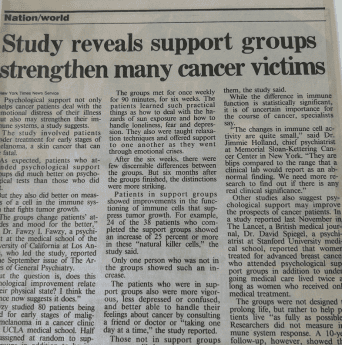
In 1990, the Chicago Tribune reported on a groundbreaking study from UCLA showing that cancer patients who participated in structured support groups experienced more than emotional relief—they demonstrated measurable improvements in immune function and quality of life. Patients who attended weekly sessions learned relaxation techniques, shared their fears and coping strategies, and reported feeling less depressed and more resilient. Notably, the study suggested that psychosocial support might even influence survival outcomes, with patients in support groups living significantly longer than those who received only medical care (Chicago Tribune, October 26, 1990).
Fifteen years later, national attention to this issue deepened. A 2005 report by the Institute of Medicine, From Cancer Patient to Cancer Survivor: Lost in Transition, underscored the importance of a comprehensive “survivorship care plan” that included psychosocial support. This was followed by Cancer Care for the Whole Patient: Meeting Psychosocial Health Needs (2007), which established psychosocial services as a new standard of care. These reports, widely covered by the Chicago Tribune, highlighted that addressing emotional and social needs leads to better adherence to treatment, reduced distress, and improved long-term outcomes. The American College of Surgeons began implementing accreditation standards requiring hospitals to screen cancer patients for psychosocial distress and refer them to appropriate services.
It was against this backdrop of mounting evidence that Wellness House, founded in 1990 in Hinsdale, Illinois, launched its free programs. From the start, the organization embraced evidence-based approaches—exercise, nutrition, counseling, stress management, and family support—proving that psychosocial care is not optional, but essential. Today, with over 525 programs offered monthly, Wellness House continues to embody what decades of research and national policy confirm: that cancer care must treat the whole person, improving not only health outcomes, but also hope and quality of life.
Sources:
Chicago Tribune, “Study reveals support groups strengthen many cancer victims,” October 26, 1990.
Institute of Medicine reports: From Cancer Patient to Cancer Survivor: Lost in Transition (2005); Cancer Care for the Whole Patient: Meeting Psychosocial Health Needs (2007).

